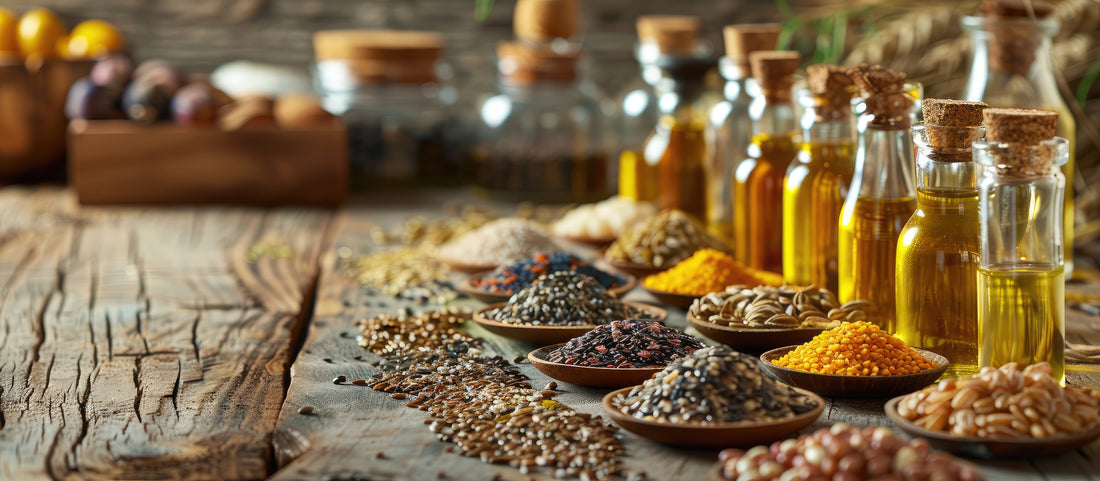
Why You Should Use Salad Dressing Without Seed Oils
Share
When you eat a fresh, crisp salad, you're making a nutritious choice—right? Not necessarily. If you're ignoring the ingredients in your dressing, you could be overlooking toxic seed oils hiding on the label.
Thankfully, we’ve got healthier alternatives that won't force you to sacrifice flavor. Discover why selecting a dressing without seed oils can ensure your salad remains delicious and nutritious.
What Are Seed Oils?
Seed oils are vegetable-based cooking oils derived from the seeds of various plants. The list includes corn, cottonseed, grapeseed, sunflower, rice bran, and peanut oil. Soybean and canola oils also join this group, even though they don’t originate from seeds. Some critics dub these the "hateful eight," due to growing health concerns.
Are Seed Oils Harmful?
Opinions may vary, but some research indicates they could be linked to health troubles.
Concerns include:
- Over-Processed: Extensive refining lowers the nutritional value and can produce harmful trans fats, which some say can be bad for your health.
- Excessive Linoleic Acid: High levels of this fatty acid might pose health risks.
- Omega-6s: Not all fats are created equal, and moderation is key. Seed oils are rich in omega-6 polyunsaturated fatty acids (PUFAs). A diet with too many PUFAs may ruin the balance of omega-3 fatty acids, which have anti-inflammatory properties. This disruption can lead to chronic inflammation that can be associated with health problems, including heart disease, metabolic syndrome, and type 2 diabetes.
Others are taking note of these concerns. Seed oils are becoming less popular with health-conscious companies. In 2023 alone, several restaurant chains switched, with Sweetgreen opting for olive oil, Shake Shack eliminating soybean oil, and Texas' Hopdoddy proudly declaring its seed oil-free menu.
Understanding Linoleic Acid
Linoleic acid is another omega-6 PUFA naturally found in many foods, including seed oils. It's one of two essential fats your body can't make alone. You can only get linoleic acid from what you eat.
The Downsides of Linoleic Acid
While small amounts, around 1 to 2 percent of daily caloric intake, are beneficial, higher consumption may be linked to various health issues due to its instability and rapid oxidation. This can lead to cellular inflammation and problems like heart disease and obesity.

Exploring Healthier Alternatives
At Fedoras, we believe that a superior salad dressing starts with the finest oils. We use alternatives like extra virgin olive oil (EVOO), renowned for its quality.
EVOO is made by cold-pressing olives. This preserves healthy fats and essential bioactive compounds while remaining low in saturated fats. A diet that includes polyphenol-rich olive oil can offer health-boosting benefits.
EVOO Vs. Seed Oils
For a healthier alternative, try extra virgin olive oil for its combination of monounsaturated fats, antioxidants, and anti-inflammatory properties.
Monounsaturated fats, considered the "good fats," are thought to enhance heart health, reduce inflammation, and help fight oxidative stress in the body with antioxidants. EVOO also retains its distinct flavor thanks to minimal processing.
Extra Virgin Olive Oil Features:
- Nutrient Absorption: Extra virgin olive oil's healthy fats help the absorption of fat-soluble vitamins, including A, D, E, and K.
- Beneficial Fats: Olive oil is high in monounsaturated fats, which promote heart health by lowering bad cholesterol, or LDL.
- Health Boosters: Some studies suggest that extra virgin olive oil may help brain health by protecting against neurodegenerative diseases like Alzheimer's. It's also an essential component of the Mediterranean diet, which is synonymous with heart-protective qualities.
- Antioxidant Strength: It is enriched with vitamin E and polyphenols, which combat free radicals and may reduce chronic disease risk.
- Anti-Inflammatory Effects: Its compounds alleviate inflammation, benefiting autoimmune conditions. Oleic acid, an omega-9 monounsaturated fat, also bolsters heart health.
- Environmental Friendliness: Cold-pressing is less energy-intensive compared to the energy and chemical-heavy processes required for refined oils.
Fedoras: Find Your Perfect Balance
The next time you reach for a salad dressing, weigh the advantages of going seed oil-free. You won’t need to sacrifice flavor or your health. Dress Accordingly™ and try Fedoras salad dressings to experience the difference that the best ingredients make.
Source:
Safflower OilGrapeseed Oil
Sunflower Oil
Corn Oil
Soybean Oil
Cottonseed Oil
Rice Bran Oil
Peanut Oil
Canola or Rapeseed Oil
Extra Virgin Olive Oil
